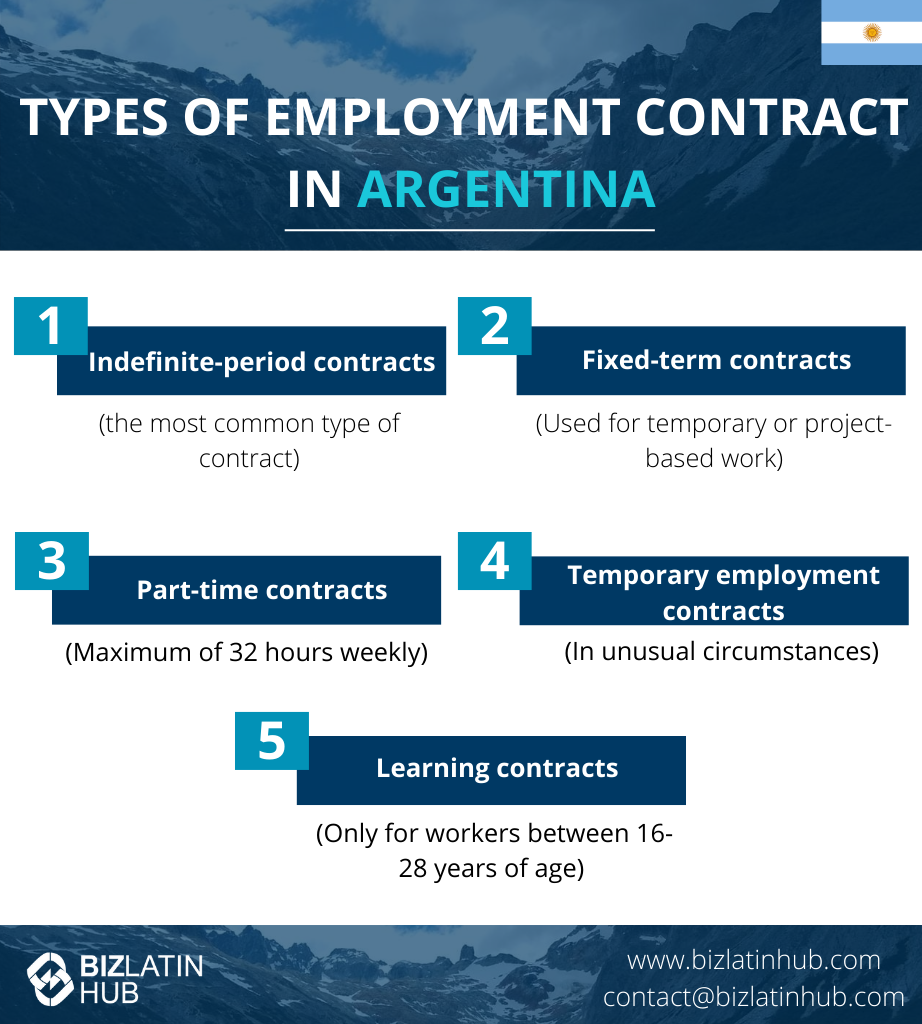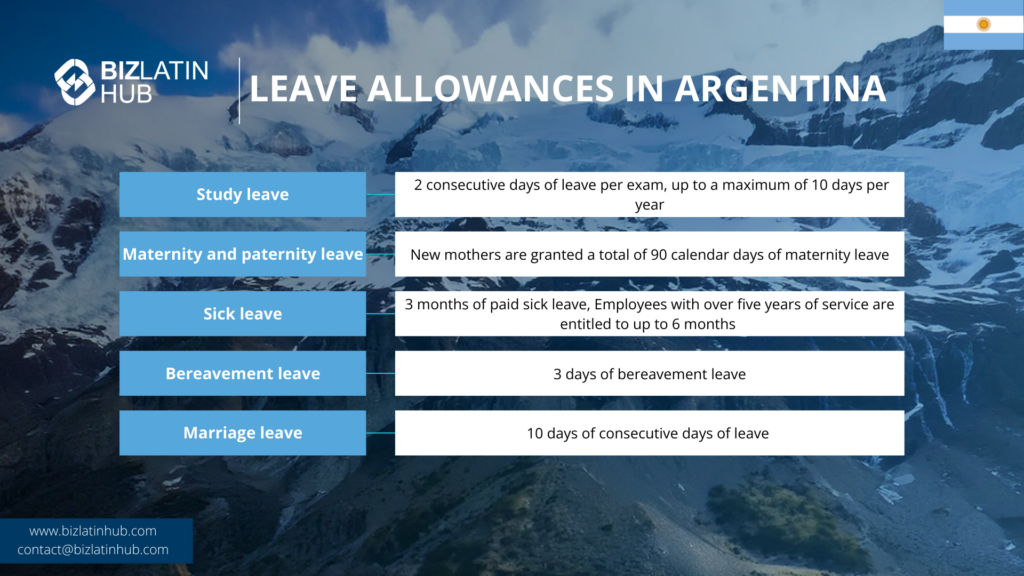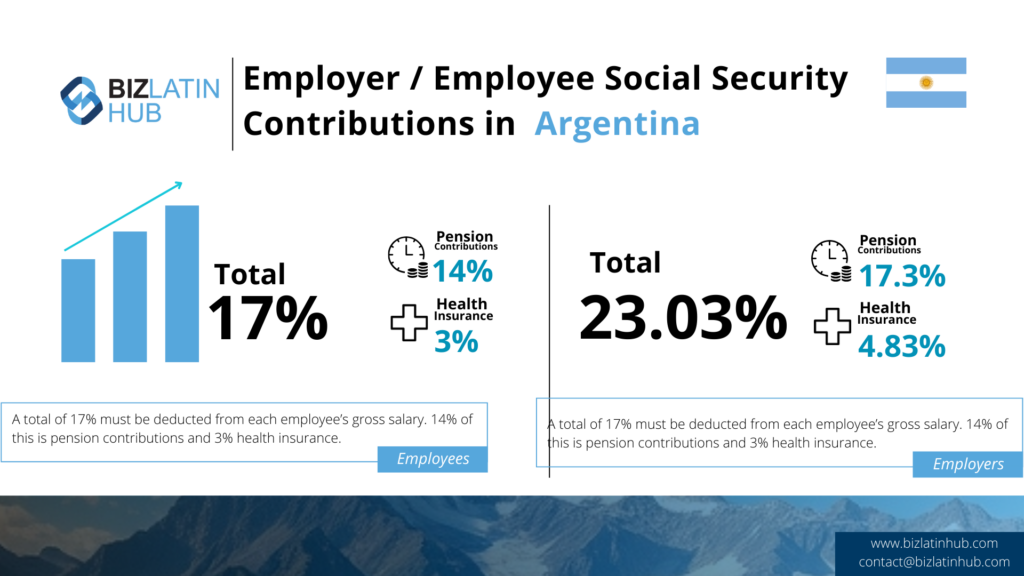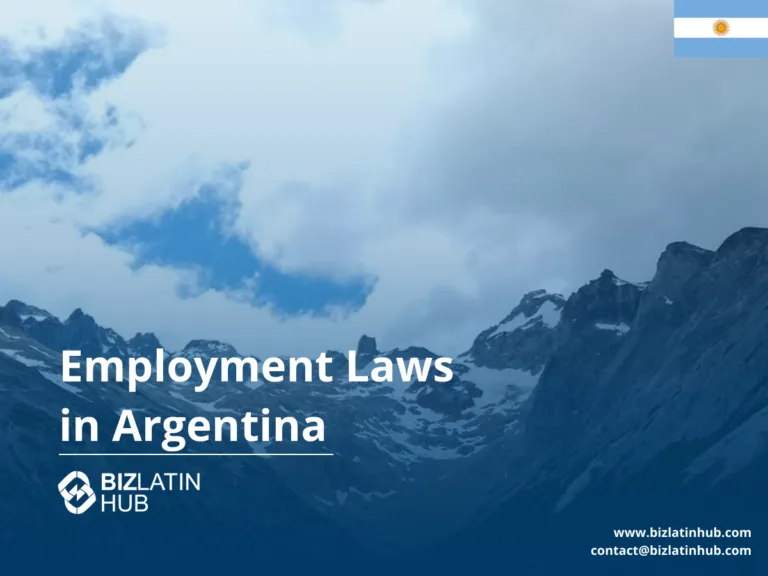Argentina’s employment laws are regulated under the Ley de Contrato de Trabajo (LCT). This 2025 guide covers employment contracts, employee rights, social benefits, working hours, and termination regulations for employers operating in Argentina. This is vital for company incorporation in Argentina.
Key Takeaways
| Working hours mandated by employment law in Argentina | Argentinian labor law sets a maximum work schedule of 8 hours per day and 48 hours per week, not including overtime. |
| Argentinian Minimum Monthly Wage | The current minimum wage as of January 2025 is ARS$286,711.00. This frequently changes but usually hovers around USD$300. |
| Types of Employment Contracts in Argentina | Indefinite-period contracts (the most common type of contract) Fixed-term contracts Part-time contracts (maximum of 32 hours weekly) Temporary employment contracts (in unusual circumstances) Learning contracts (only for workers between 16-28 years of age) |
| Percentage of an employee’s salary contributed to social security in Argentina | A total of 17% must be deducted from each employee’s gross salary. 14% of this is pension contributions and 3% health insurance. Employers must also contribute the equivalent of 23.03% of an employee’s gross salary, made up of 17.3% in pension contributions, 4.83% towards health insurance, and 0.9% towards the national employment fund. |
Overview of Argentine Labor Law
The labor laws in Argentina are comprehensive, well developed and strictly applied by the Ministry of Human Capital. This covers such things as severance and minimum notice; maximum working hours; contract types and conditions; mandatory contributions for both employers and employees; a wide range of leave allowances; overtime conditions and rates; minimum wage regulations.
Employment Contract Types in Argentina
While there are many different types of contract allowed under employment law in Argentina, the following five are the most commonly used. It is also important to note that Argentina labor laws make the distinction between a labor relationship and an independent contractor relationship, not in relation to the length or content of the contract, but to the real nature of the services.

Indefinite-term contracts
These are the most common type of contract and only end when both the employer and employee come to a mutual agreement, or when one of the parties has the right to act unilaterally, such as an employee resigning or an employer firing them for misconduct.
Part-time contracts are only provided for roles with limited hours, and anyone on a part-time contract cannot work for more than two-thirds of a standard working week, meaning a maximum of 32 hours per week.
Fixed-term and temporary contracts
Lasting for a period of time specified by the contract, these are generally used for the completion of a particular task or project that has a clear end or completion date. Such a contract cannot last for longer than five years. Temporary employment contracts are only allowed under extraordinary conditions. While the period of the contract does not have to be stated, a temporary contract can only be for a maximum of six months within a 12 month period, or a maximum of 12 months within a three year period.
Trial and seasonal contracts
These are intended for people learning vital skills for a role they will move into on an indefinite contract. As such, they can only be administered to people between 16 and 28 years old and can only last between 3 and 12 months.
Termination and Severance Pay Rules in Argentina
According to employment law in Argentina, an employee is obliged to provide 15 days of notice of their intention to resign from their role. In the event that they provide shorter notice, the employer can reduce any final payment due, but only if they enter a proper judicial process and prove the untimely departure has caused them pecuniary damages.
When an employer chooses to terminate the employee’s contract without just cause, they must provide a notice period based on the seniority of the staff member, ranging from 15 days when they are still in their probationary period to two months when they have been with the company for more than five years. Probationary periods may be up to six months. Employees who have passed their probation but served less than five years must be given one month of notice.

In the event the employer wishes for the employee to vacate their position sooner than the end of the designated notice period, the employee is still due payment for the entire period, as well as an additional payment equal to 15 days of salary.
Any employee who leaves voluntarily or has their contract terminated without just cause is also due the following compensation, under employment law in Argentina:
- Payment for all hours worked
- Payment for outstanding vacations
- A proportion of outstanding payments related to the statutory annual bonus (13th salary), based on how much of the year they have worked
In the case of an employee who is dismissed without just cause, they will also be due a seniority bonus based on the length of their service, which will be equal to one month of their highest monthly salary during their period of employment for every year worked.
In the event of dismissal with just cause, such as failure to properly undertake duties or the committing of crime to the detriment of the company, the employer must be able to prove just cause in a judicial process or will be liable for compensation.
Work Hours, Leave, and Overtime
Under employment law in Argentina, a standard working week should be no longer than 48 hours long, with each working day lasting eight hours. All workers are entitled to a break of 35 consecutive hours each week, usually beginning at 13:00 on Saturday unless their role specifically demands weekend hours.
Should an employee work more than 48 hours in a given week, by law they must receive additional pay proportionate to the extra time worked. Note that in Argentina, there are generally around 15 national holidays that fall on weekdays each calendar year.
Employment law in Argentina establishes that employees who have served at least one year are entitled to consecutive days of paid time off (PTO) per calendar year based on their seniority with the company, calculated as follows. It is also important to understand that minimum statutory employment terms and conditions are set forth in the legal regulations and applicable CBAs. Labor provisions are of public order, and they apply to all employment contracts whether written or not.
The main issues included, but are not limited to: remuneration; annual vacations and special leaves of absence; holidays and non-working days; daily and weekly working and resting hours; special provisions for women and children; illness; and termination or transfer of a labor contract.
- 14 days for less than five years of service
- 21 days for more than five but less than 10 years of service
- 28 days for more than 10 years but less than 20 years of service
- 35 days for more than 20 years of service
- Study leave: Employees who are enrolled in high school or higher education are granted two consecutive days of leave for any exam they must sit, with a maximum of 10 days of study leave granted per calendar year.
- Maternity and paternity leave: New mothers are granted a total of 90 calendar days of maternity leave, which can begin either 30 or 45 days prior to a due date documented by a certified doctor. In the event of a premature birth, the mother is still guaranteed the full 90 days of leave. For new fathers, two consecutive days of paternity leave are granted. Both laws are guaranteed under employment law in Argentina.
- Sick leave: The maximum period for which an employee can claim remuneration for work missed due to illness or injury depends on their seniority and how many dependents they have. Anyone who has worked for less than five years will be entitled to up to three months of paid sick leave, while those who have worked for more than five years will be entitled to up to six months. In the event the employee has dependents, that allowance is doubled.
- Bereavement leave: Under employment law in Argentina, three days of bereavement leave will be granted in the event of the death of an employee’s spouse, child, or parent, while one day of leave is granted in the event an employee’s sibling dies.
- Marriage leave: When an employee gets married, 10 days of consecutive days of leave are granted.

Employee deductions:
A total of 17% must be deducted from each employee’s gross salary by the employer, made up of 14% for pension contributions and 3% for health insurance.
Employer contributions
Employers must contribute the equivalent of 23.03% of an employee’s gross salary, made up of 17.3% in pension contributions, 4.83% towards health insurance, and 0.9% towards the national employment fund.
| Category | Employer Obligations | Employee Rights |
|---|---|---|
| Work Hours | Max 48 hours/week, 8 hours/day | Overtime compensation and weekly rest |
| Contracts | Must be formalized in writing | Receive written contract and legal protections |
| Social Security | Register with AFIP and pay social contributions | Healthcare, pension, family allowances |
| Paid Leave | Minimum 14 to 35 days/year depending on tenure | Vacation, public holidays, maternity/paternity |
| Severance | Severance equals 1 month per year + accrued benefits if without cause | Legal protection from unfair dismissal |

FAQs about employment law in Argentina
In our experience, these are the common questions we receive from potential clients.
1. What are the labor laws in Argentina?
The labor laws in Argentina are comprehensive, well developed and strictly applied by the Ministry of Human Capital. This covers such things as severance and minimum notice; maximum working hours; contract types and conditions; mandatory contributions for both employers and employees; a wide range of leave allowances; overtime conditions and rates; minimum wage regulations.
2. What are the working conditions in Argentina?
The working conditions in Argentina are regulated by law to ensure the well-being of workers. This includes a 48-hour workweek, one day off per week, overtime rates, paid vacations, social security, and healthcare benefits. Adherence to these regulations may vary across industries. By regional standards, Argentines enjoy relatively good working conditions.
3. What is the standard working week in Argentina?
The law allows up to 48 hours per week, with no more than 8 hours per day. Overtime is capped at 30 hours/month and paid at 150%–200%.
4. What is the minimum salary in Argentina?
The minimum salary in Argentina is ARS$286,711.00 per month in January 2025, increasing to ARS$292,446 in February 2025. However, this is frequently changed due to high inflation, often monthly. Full guides for the year have not yet been approved by the government. It is usually around USD$300 by the official exchange rate though, to give a guide of what you should expect.
5. How is overtime paid in Argentina?
Employees in Argentina are entitled to receive 150% of their regular pay for working overtime. On holidays, Sundays, and their normal rest days, this rate increases to 200%. However, there are limitations on the amount of overtime that can be worked. It should not exceed three hours per day, 30 hours per month, or 200 hours per year.
6. What are the laws regarding employment termination in Argentina?
When terminating an employee in Argentina, the employer must follow certain laws. This includes providing written notice of the dismissal through a notary public or certified letter. A minimum notice period must be given, which varies according to length of service with the company. Various compensation clauses such as outstanding holiday and pro rata payments of the aguinaldo (13th month bonus) must also be paid.
If the termination is due to cause, the employer must also inform the employee in writing about the allegations that led to the dismissal.
7. What happens when an employee quits in Argentina?
Employees in Argentina have the option to resign by providing their employer with 15 days of notice or by compensating their employer with 15 days’ salary.
8. Are written contracts required in Argentina?
Yes. All employment relationships must be documented with a written contract, filed with the tax and social security authorities.
9. What is the vacation entitlement in Argentina?
Paid vacation ranges from 14 to 35 calendar days per year, depending on the employee’s years of service.
10. What social contributions must employers pay?
Employers contribute to:
Social security (retirement and health)
PAMI (elder care)
Family allowance fund
Total employer burden is approx. 27–30% of gross salary.
11. What is the severance pay obligation for dismissal without cause?
Severance equals one month’s salary per year of service, plus unused vacation and mandatory bonuses (SAC).
12. Can foreign companies hire employees in Argentina without a local entity?
No. A local entity or Employer of Record (EOR) is required for compliant hiring in Argentina.
Biz Latin Hub can assist you with employment law in Argentina
At Biz Latin Hub, we offer market entry support and packages of integrated back-office services tailored to the individual needs of our clients.
Our portfolio includes accounting & taxation, company formation, due diligence, legal services, and hiring & PEO, and we are active in a range of markets around Latin America and the Caribbean.
That makes us the ideal partner for supporting cross-border operations and facilitating multi-jurisdiction market entry.
We are committed to compliance with regulations everywhere we operate, so working with us comes with the guarantee that your company will adhere to every aspect of employment law in Argentina, or any other country where we assist you.
Contact us today to find out more about how we can support you doing business in Argentina.
Or learn more about our team and expert authors.






